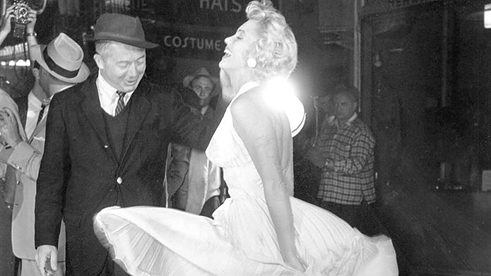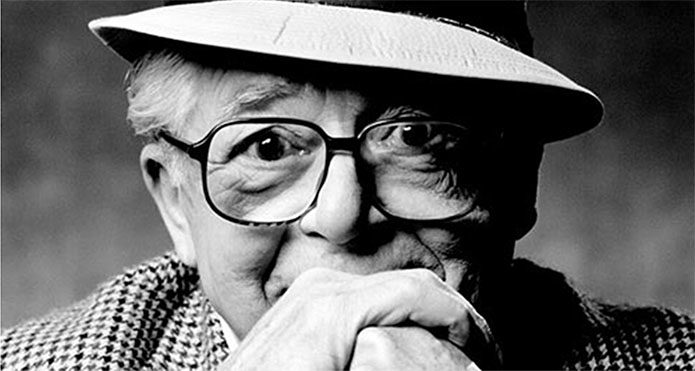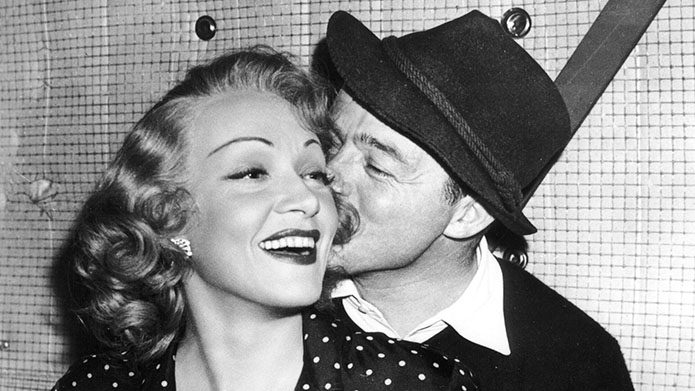Jewish International Film Festival
From Berlin to Hollywood: Never Be Boring: Billy Wilder

“Come to Berlin,” a young Billy Wilder was told. Long before he was a filmmaker with 'Double Indemnity', 'Sunset Boulevard', 'Some Like It Hot' and 'The Apartment' to his name, he was a journalist, enticed from the Austria of his childhood to Germany in search of better career opportunities. His stay would end when Hitler began to rise to power, with Wilder then deciding to move to Paris; however, it was in Berlin that he wrote his first screenplays.
Stepping through the life and impact of the influential writer/director, Never Be Boring: Billy Wilder charts the legacy that sprang from those humble beginnings — the initial opportunities that put him on the road to Hollywood, the leap to the US via Paris, and the resume he’d build as he found his place at the forefront of the film industry for decades. Compiled by helmers André Schäfer and Jascha Hannover from current and archival interviews and footage, the factual effort that results is a straightforward but still shrewd dip through Wilder’s history, approach and filmography.
 'Never Be Boring: Billy Wilder' charts the legacy that sprang from his humble beginnings.
| © Jewish International Film Fesival
Accordingly, the talking heads of filmmaker Volker Schlöndorff, actor Mario Adorf, actress Marthe Keller and Charles Matthau, son of Walter, share the screen with clips from throughout Wilder’s working life. Critics, colleagues, acquaintances and more chat about his motivations, his penchant for collaborations and his reaction to the Second World War — in his move to comedy after the horrors that swept Europe, his friendships with other German-language directors in America, and his determination to build a replica of the Brandenburg gate when the Berlin Wall went up during the shooting of One, Two, Three, for example — relaying both personal and professional anecdotes. In between, scenes from his features and shots from his trailers help flesh out their tales, while behind-the-scenes vision and excerpts from other documentaries fill in other gaps. Each reveals a piece of Wilder’s story, whether talking about his rise to prominence, his heyday or his fade from the top when a new breed of talent took over in the 1970s.
'Never Be Boring: Billy Wilder' charts the legacy that sprang from his humble beginnings.
| © Jewish International Film Fesival
Accordingly, the talking heads of filmmaker Volker Schlöndorff, actor Mario Adorf, actress Marthe Keller and Charles Matthau, son of Walter, share the screen with clips from throughout Wilder’s working life. Critics, colleagues, acquaintances and more chat about his motivations, his penchant for collaborations and his reaction to the Second World War — in his move to comedy after the horrors that swept Europe, his friendships with other German-language directors in America, and his determination to build a replica of the Brandenburg gate when the Berlin Wall went up during the shooting of One, Two, Three, for example — relaying both personal and professional anecdotes. In between, scenes from his features and shots from his trailers help flesh out their tales, while behind-the-scenes vision and excerpts from other documentaries fill in other gaps. Each reveals a piece of Wilder’s story, whether talking about his rise to prominence, his heyday or his fade from the top when a new breed of talent took over in the 1970s.
A sense of the man behind the movies
Indeed, if the mark of a good biographical documentary stems from its breadth and insights, then Never Be Boring: Billy Wilder delivers in the usual fashion. Like all star portraits, it’s an act of both curation and investigation, assembling known parts and probing intriguing areas, the latter primarily through to-camera discussions with the film’s various interviewees. The little details stand out, even if they’re already a matter of public record: Wilder’s famed “how would Lubitsch do it?” sign above his desk, his penchant for shopping that gave rise to a sizeable art collection, and his manner of conveying Marilyn Monroe’s allure on screen. More than that, however, a sense of the man behind the movies also shines: his dedication and enthusiasm; the degree of perfectionism and precision exercised in turning his scripts into films; and his determination to keep working in his later years, even after he had stopped being able to make movies. Compiled by helmers André Schäfer and Jascha Hannover from current and archival interviews and footage, the factual effort that results is a straightforward but still shrewd dip through Wilder’s history, approach and filmography.
| © Jewish International Film Fesival
If the assortment of film segments that goes along with the above seems standard, it’s through familiarity; with The Lost Weekend, Ace in the Hole, Stalag 17, Sabrina, The Seven Year Itch and Irma la Douce also to his credit, Wilder’s renown is wide and his impact considerable, and has been for more than half a century. Edited together jauntily, with a similarly toned score, they’re snippets of a body of work that speaks for itself, littered judiciously throughout a documentary that endeavours to summarise and add to
Compiled by helmers André Schäfer and Jascha Hannover from current and archival interviews and footage, the factual effort that results is a straightforward but still shrewd dip through Wilder’s history, approach and filmography.
| © Jewish International Film Fesival
If the assortment of film segments that goes along with the above seems standard, it’s through familiarity; with The Lost Weekend, Ace in the Hole, Stalag 17, Sabrina, The Seven Year Itch and Irma la Douce also to his credit, Wilder’s renown is wide and his impact considerable, and has been for more than half a century. Edited together jauntily, with a similarly toned score, they’re snippets of a body of work that speaks for itself, littered judiciously throughout a documentary that endeavours to summarise and add tothe conversation.
.